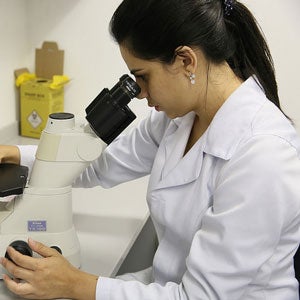

A total of 17 new research proposals on Zika will be conducted in Latin America and the Caribbean to identify solutions to address this virus, which causes congenital brain abnormalities when pregnant women are infected, and triggers Guillain-Barré syndrome in some infected people.
The new research proposals are aimed at identifying solutions to address the virus. They range from the identification of transmission risk factors to the evaluation of diagnostic tools.
Geneva/Washington, DC, February 23, 2017 (PAHO/WHO)-A total of 17 new research proposals on Zika will be conducted in Latin America and the Caribbean to identify solutions to address this virus, which causes congenital brain abnormalities when pregnant women are infected, and triggers Guillain-Barré syndrome in some infected people.
The research projects, ranging from the identification of transmission risk factors to evaluating diagnostic tools and examining the use of prenatal counseling and contraceptives, are part of a joint initiative between the Pan American Health Organization (PAHO) and two World Health Organization (WHO) programs: the Special Program for Research and Training in Tropical Diseases (TDR) and the Special Program for Research, Development and Training in Research in Human Reproduction (HRP).
"These research projects are crucial for improving our understanding of the dynamics of the Zika epidemic-- and potential public health solutions," said Dr. Francisco Becerra, Assistant Director of PAHO, WHO regional office for the Americas.
Research will be carried out by leading academic institutions and nongovernmental organizations in Brazil (7 investigations), Colombia (4), Honduras (1), Jamaica (1), Mexico (1), Peru (2) and Venezuela (1). Each research project is due to receive up to US $20,000 from the WHO small grants program.
"This is the kind of collaboration that is critical to finding solutions that transcend areas of expertise," said TDR director John Reeder. "We are pleased to be contributing to the WHO Zika Strategic Response Framework," he added.
HRP director Ian Askew agreed: "The Zika outbreak has challenged conventional approaches to addressing health emergencies. Supporting research that addresses the interactions between transmission, behavior and outcomes, and that can provide quick and timely information to policy makers, is absolutely essential."
The initiative is part of the research capacity strengthening programs of HRP and TDR, and has received additional funds from the WHO Zika Strategic Response Plan. In total, the initiative received 78 proposals from 19 countries.
The Zika virus is transmitted by the Aedes mosquito, and last year's outbreak, particularly in Brazil, was associated with an increase in serious complications among newborns. A systematic review by WHO researchers in 2016 concluded that Zika virus infection during pregnancy is a cause of congenital brain anomalies, including microcephaly, and that Zika is a trigger for Guillain-Barré syndrome-a rare condition in which a person's immune system attacks the peripheral nerves. Intense efforts have continued to investigate the link between Zika and a range of neurological disorders within a rigorous research framework.
For the complete list of grantees, see: www.who.int/tdr/news/2017/zika-research-in-amr/en/
Links
- PAHO Zika resources
- PAHO Zika research projects
- TDR
- HRP
- The WHO Zika Virus Research Agenda



